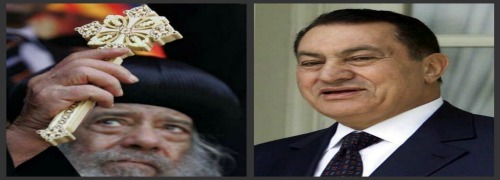 Large numbers of Copts supported the Egyptian revolution, but they now fear that a recent escalation in violence and discrimination is only likely to worsen following likely Islamist victories at the polls this autumn.
Large numbers of Copts supported the Egyptian revolution, but they now fear that a recent escalation in violence and discrimination is only likely to worsen following likely Islamist victories at the polls this autumn.
A mass Christian exodus from Egypt, similar to the one that took place in Iraq, seems almost inevitable.
This February saw separate brutal attacks against two Coptic monasteries -- the Anba Bishoy Monastery in Wadi Al-Natroun, 110 kilometres north of Cairo, and the Anba Makarious Al Sakandarie Monastery in Al Fayoum, 130 kilometres south west of the capital.
On March 4, angry crowds burned down the Coptic church of St Mina and St George - together with its irreplaceable relics - in the village of Sool, about 30 km from Cairo.
Then on March 8, a mob armed with guns, clubs, and Molotov cocktails attacked a group of Copts who were demonstrating against the Sool church burning in front of the state television broadcasting building in Cairo.
The Egyptian army, called in to restore order, instead used more violence. Some 13 people were killed and over 100 wounded.
On May 7, two more churches were attacked and at least 12 people were killed and more than 200 wounded in the poor, largely Christian neighbourhood of Imbaba, in north-west Cairo.
Islamists, incited by a rumour of a Muslim woman held captive by Copts, stormed the St Mina Church, burned the Church of the Virgin Mary to the ground, looted and vandalised several Christian-owned shops, and threw Molotov cocktails at an apartment building.
Other attacks have included one on a Coptic man, Ayman Anwar Mitri, who had his ear cut off by suspected Islamic extremists in Qena, and there have also been reports of the kidnapping and rape of Coptic girls.
We believe that Salafists are to blame for most of these incidents and that the inacton of law enforcers - not a single person has been convicted in any of the incidents mentioned above - is allowing the people to do whatever they want.
I think that some of the country's more radical Islamists, including Salafists and members of the Muslim Brotherhood, MB, are using violence to establish Egypt's identity as a thoroughly Islamicised and Arabicised state.
The Salafists were never interested in political participation previously, but now they have started playing a more active role, pushing themselves onto the political scene in a very vulgar way. They are not as strong as the MB but they are trying to form an alliance with them.
And at least with the Salafists you get what you see -- the problem with the MB is that they speak very sweetly about respecting all religions and people's rights, but there is absolutely zero trust in them from the Christian communit y, and they are also criticised fiercely by liberal Muslims.
It is hard to predict how successful the MB will be in elections later this year. From listening to their own propaganda , one would imagine they would win 90 per cent of the vote, but experts have put their predicted share as low as 15 per cent, with a recent poll giving them even less. But the fear is still there.
The church plays a very powerful role in the daily lives of Egyptian Christians, although it has so far held out against any official political participation. But some Copts are getting involved in liberal political parties, most notably the Free Egyptians party founded by businessman Naguib Sawiris, and working alongside liberal Muslims.
On the face of it, people are tolerant, but below the surface it is very different. You see this on Friday around prayer time, when the imams often broadcast very anti-Christian messages. This has been going on forever and the authorities have never done anything about it. Indeed , Mubarak managed to exploit the fear of Islamic fundamentalism to get the support of the Christians during his regime.
The greatest challenge we face is building a culture of tolerance, and it may take decades. Copts are worried about the influence that the Salafists have on previously neutral, but poorly educated Muslim citizens -- a legacy of Mubarak's decrepit education system. But at the very least, confronting sectarianism needs to become a priority that extends beyond the facades of newly-painted churches.
Officially all the Christian sects make up some ten per cent of Egypt's 80 million population. But the church itself says that there are at least 12 million Christians, and they have very reliable statistics through the registration of all births and marriages. There are also at least two million Egyptians Copts resident in the West, and it looks like this number is going to rise sharply.
After the burning of churches and other attacks Christians feel in danger. The British-based Copts website I run has been deluged with enquiries from Egyptian Copts about how to apply for asylum outside, and Copts have been queuing up at embassies in Egypt to try and emigrate. In Iraq after the war, at least 50 per cent of the Christians left the country in the face of sectarian violence. I hope we will not see a repeat of this in Egypt.



